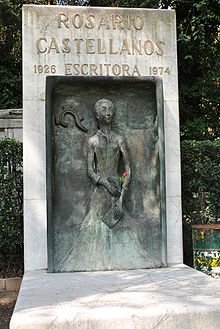Rosario Castellanos (writer)
Rosario Castellanos Figueroa (born May 25, 1925 in Mexico City , † August 7, 1974 in Tel Aviv ) was a Mexican poet and writer.
Along with other members of the 1950 generation , she was one of the most important literary voices in Mexico in the last century. Throughout her life she has spoken eloquently about cultural and gender oppression, and her work has influenced feminist theory and practice as well as cultural studies . Although she died young, she opened up Mexican literature to women and left a legacy that is still relevant today.
Life
Born in Mexico City , she grew up on the family ranch near Comitán de Domínguez in the southern state of Chiapas . She was an introverted young girl who watched with sympathy the plight of the indigenous Mayans who worked for her family. According to her own statements, she felt estranged from her family after a fortune teller predicted that one of her mother's two children was about to die and her mother exclaimed, "Not the boy!"
The fate of the family took a turn after Mexican President Lazaro Cardenas , a land reform through continued trying to advance the emancipation of the peasants. The family lost part of their land. When Rosario Castellanos was sixteen, her parents moved her to Mexico City. A year later, her parents were dead and she had to get along on her own.
Although she remained introverted, she joined a group of Mexican and Central American intellectuals, read a lot and began to write. She studied philosophy and literature at the National Autonomous University of Mexico , where she later taught, and joined the Instituto Nacional Indigenista in, wrote pieces for the puppet theater, which were shown in poor areas, the literacy to promote. The institute was founded by President Cárdenas. She also wrote a weekly column for the Excélsior newspaper .
In addition to her literary work, Castellanos also held various official offices, for example she headed the press office of the UNAM and was secretary of the PEN
In 1971 she was appointed Mexican Ambassador to Israel in recognition of her services to Mexican literature .
On August 7, 1974, Castellanos died in an accident in Tel Aviv . Although there is no evidence of this, there is also speculation of suicide.
plant
Castellanos wrote poems, essays, a major play and two novels: the semi-autobiographical novel Balún Canán and Oficio de tinieblas , which depicts a Tzotzil uprising in Chiapas and is based on events in the 19th century. Although she herself is a Ladina , i. H. was of European and not Indian origin, Castellano showed commitment and understanding for the indigenous peoples.
Works (selection)
- Balún-Canán (1957), German The nine guards , novel
- Poemas (1953–1955) (1957)
- Ciudad Real: Cuentos (1960)
- Oficio de tinieblas (1962), German The dark smile of Catalina Díaz , novel
- Album de familia (1971)
- Poesía no eres tú; Obra poética: 1948–1971 (1972)
- Mujer que sabe latín ... (1973)
- El eterno femenino: Farsa (1973)
- El viudo Román , dt. The virtue of the women of Comitán , story
Individual evidence
Web links
- Literature by and about Rosario Castellanos in the catalog of the German National Library
- Literature by and about Rosario Castellanos (writer) in the catalog of the Ibero-American Institute of Prussian Cultural Heritage, Berlin
- Literature by and about Rosario Castellanos in the catalog of the library of the Instituto Cervantes in Germany
| predecessor | Office | successor |
|---|---|---|
| José Joaquín Bernal y García Pimentel |
Mexican Ambassador to Tel Aviv April 8, 1971 to August 7, 1974 |
Benito Berlín Ovseyech |
| personal data | |
|---|---|
| SURNAME | Castellanos, Rosario |
| ALTERNATIVE NAMES | Castellanos Figueroa, Rosario |
| BRIEF DESCRIPTION | Mexican poet and writer |
| DATE OF BIRTH | May 25, 1925 |
| PLACE OF BIRTH | Mexico city |
| DATE OF DEATH | 7th August 1974 |
| Place of death | Tel Aviv |
